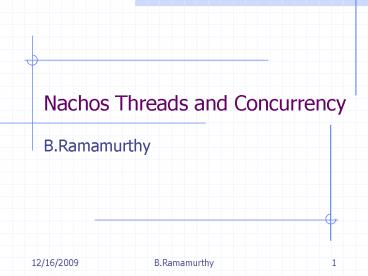Nachos Threads and Concurrency - PowerPoint PPT Presentation
1 / 14
Title:
Nachos Threads and Concurrency
Description:
... registers, program counter and stack, but the address space is ... Each thread has its own private attributes: stack, program counter and register context. ... – PowerPoint PPT presentation
Number of Views:189
Avg rating:3.0/5.0
Title: Nachos Threads and Concurrency
1
Nachos Threads and Concurrency
- B.Ramamurthy
2
Thread
- Unit of work
- A process has address space, registers, PC and
stack (See Section 3, page 9.. in A Roadmap
through Nachos for the detailed list) - A thread has registers, program counter and
stack, but the address space is shared with
process that started it. - This means that a user level thread could be
invoked without assistance from the OS. This low
overhead is one of the main advantages of
threads. - If a thread of a process is blocked, the process
could go on. - Concurrency Many threads could be operating
concurrently, on a multi threaded kernel. - User level scheduling is simplified and realistic
(bound, unbound, set concurrency, priorities
etc.) - Communication among the threads is easy and can
be carried out without OS intervention.
3
Thread requirements
- An execution state
- Independent PC working within the same process.
- An execution stack.
- Per-thread static storage for local variables.
- Access to memory and resources of the
creator-process shared with all other threads in
the task. - Key benefits less time to create than creating a
new process, less time to switch, less time to
terminate, more intuitive for implementing
concurrency if the application is a collection of
execution units.
4
Threads and Processes
- A thread is a unit of work to a CPU. It is strand
of control flow. - A traditional UNIX process has a single thread
that has sole possession of the processs memory
and resources. - Threads within a process are scheduled and
execute independently. - Many threads may share the same address space.
- Each thread has its own private attributes
stack, program counter and register context.
5
Threads and Processes
(nachos model)
6
Thread Operations
- Basic Operations associated with a thread are
- Spawn newly created into the ready state
- Block waiting for an event
- Unblock moved into ready from blocked
- Finish exit after normal or abnormal
termination.
7
Nachos Threads (Section 3, .. RoadMap)
- Nachos process has an address space, a single
thread of control, and other objects such as open
file descriptors. - Global variables are shared among threads.
- Nachos scheduler maintains a data structure
called ready list which keeps track of threads
that are ready to execute. - Each thread has an associated state READY,
RUNNING, BLOCKED, JUST_CREATED - Global variable currentThread always points to
the currently running thread.
8
Nachos Thread Description and Control
- Thread specific data local data, stack and
registers such as PC, SP. - Control
- Thread creation (Ex fork)
- Thread schedule (Ex yield)
- Thread synchronization (Ex using barrier?)
- Code for execution (Ex forks function parameter)
9
Nachos Thread Class
Thread
//operations Thread Thread(char name) Thread
Thread(char name, int priority) Fork
(VoidFunctioNPtr func, int arg) void Yield() //
SchedulerFindNextToRun() void Sleep() //
change state to BLOCKED void Finish() //
cleanup void CheckOverflow()// stack
overflow void setStatus(ThreadStatus st)
//ready, running..
// blocked char getName() void
Print() //print name
//data intstackTop int machineStateMachineState
Size//registers int stack ThreadStatus
status char name
10
Thread Control and Scheduling
- Switch (oldThread, newThread)
- // assembly language routine
- Threads that are ready kept in a ready list.
- The scheduler decides which thread to run next.
- Nachos Scheduling policy is FIFO.
11
Nachos Scheduler Class
Scheduler
Scheduler() Scheduler() void
ReadyTnRun(Thread thread) Thread
FindNextToRun() void Run(Thread
nextThread) void Print()
List readyList
12
Barrier Synchronization
- Barrier is a synchronization primitive to
synchronize among 2 or more threads. (n threads) - Threads executing barrier synch wait until the
expected number of threads execute the barrier
synch primitive, at which time they are all
released. - This is similar to rendevouz concept in Ada
language.
13
Nachos Barrier.h
- class Barrier
- public
- Barrier(char debugName, int size)
- Barrier()
- char getName() return name //
debugging assist - void barrierSynch()
- void print()
- private
- char name // for
debugging - // plus some other stuff you'll need to
define
14
Barrier Usage
//Thread 2
//thread 1 Barrier bar new Barrier (sample,
3) . . bar.barrierSynch() // occurs a
t(1) //thread blocked
bar.barrierSynch() //occurs at t(2) //thread
blocked
//Thread 3
bar.barrierSynch() //occurs at t(3) //all
threads are released
You are required to implement a kernel level
barriers and corresponding system calls to
barriers From user programs































